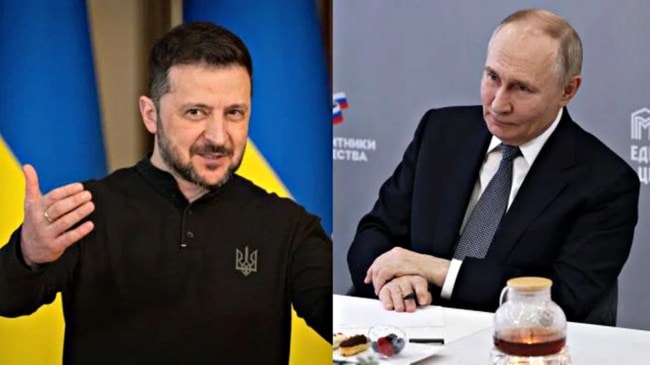Opinion What if Russia ‘loses’?
It may manifest as a ceasefire forced by exhaustion, a major territorial rollback, a fractured regime, or even a negotiated exit under international pressure
 TThe international community must begin preparing now for a scenario where Russia doesn’t just lose a war — it loses its cohesion, its stability, and its place in the global order (Source: File)
TThe international community must begin preparing now for a scenario where Russia doesn’t just lose a war — it loses its cohesion, its stability, and its place in the global order (Source: File) As the war in Ukraine stretches into its third year, a once-unthinkable question has become alarmingly relevant: Can Russia actually lose? And if so, what would the world look like on the other side of that loss?
The notion of Russian defeat was once relegated to fantasy in Western war rooms and political analyses. But recent developments have upended conventional wisdom. Ukraine’s increasing military proficiency, bolstered by a steady stream of Western support and long-range capabilities, is now challenging Russian power not only at the front but deep inside its territory. The massive drone assault, dubbed Operation Spiderweb, which destroyed or damaged nearly 34 per cent of Russia’s strategic bomber fleet, is emblematic of this shift. Simultaneously, Russia faces economic degradation, internal political fragility, and growing global isolation.
However, even if Ukraine wins militarily, a broader question looms: What happens to Russia? A post-defeat Russia may not yield a peace dividend, but instead trigger geopolitical instability on a scale unseen since the fall of the Soviet Union.
Ukraine’s battlefield success is increasingly credible. With NATO-grade training, intelligence, and equipment, Ukrainian forces are able to mount effective counter-offensives and execute precision strikes deep into Russian territory. A sudden collapse of Russia’s frontline defences — triggered by failing logistics, low morale, or an unanticipated Ukrainian breakthrough — could open the gates for the liberation of occupied territories, including Crimea.
Sanctions have taken a deep toll. Russia’s GDP has shrunk significantly, with the economy reportedly down 10–12 per cent and personal incomes slashed by 20–25 per cent. The war effort, meanwhile, is costing billions in treasure and trust. Russia is increasingly dependent on fragile exports and circumventing sanctions via gray markets. In the long run, this is not a sustainable model, especially as military demands escalate.
The political risk to the Kremlin, too, is real. The longer the war drags on, the higher the probability of unrest, factionalism, or even elite coups. Russia’s monolithic political front hides cracks among oligarchs, security services, and regional leaders. A failed war could expose those fractures.
If Russia escalates to nuclear or other strategic weapons use and fails to achieve results, it may find itself internationally isolated and internally shamed. Alternatively, a major military miscalculation could spark escalation involving NATO or other regional actors, compounding losses.
A Russian loss, however, is unlikely to be clean or clearly demarcated. It might not resemble surrender or collapse in a traditional sense. Instead, it may manifest as a ceasefire forced by exhaustion, a major territorial rollback, a fractured regime, or even a negotiated exit under international pressure.
In a best-case scenario, Ukraine reclaims its territory through military force and diplomatic pressure. Russia, under either a weakened Putin or successor leadership, agrees to an armistice brokered by international actors such as the UN or China. A new line of control could emerge, alongside complex negotiations about reparations, war crimes accountability, and reconstruction.
A far more dangerous scenario is Russian internal collapse. With over 80 federal subjects, many with distinct ethnic and regional identities, the Russian Federation could fragment in the face of prolonged crisis. Republics such as Tatarstan, Chechnya, and Dagestan might push for autonomy or independence, as could Siberian or Far Eastern oblasts.
This implosion scenario brings enormous risks: Loss of nuclear command and control, civil war among rival factions, territorial disputes and refugee flows, and the rise of paramilitary warlords or regional strongmen.
A post-defeat Russia would reshape global diplomacy and security frameworks. NATO would likely consolidate its gains, potentially incorporating Ukraine and Georgia. Europe would fully sever energy ties with Russia. The UN Security Council could face calls for reform. And China might step in to stabilise or exploit Russia’s eastern regions, increasing its Eurasian dominance.
The Global South, meanwhile, may reevaluate its alignment with authoritarian regimes and double down on non-alignment strategies. India, Brazil, and others would likely assert more diplomatic autonomy.
Russia possesses the world’s largest nuclear arsenal. If it loses the war, ensuring that warheads, delivery systems, and command structures do not fall into rogue hands is paramount. This could necessitate unprecedented international cooperation, including with China, to form inspection regimes or deploy multinational rapid response teams.
Millions could be displaced. Neighbouring states — from the Baltic to Central Asia — would face destabilising refugee flows. The UNHCR and NGOs would need emergency plans, supply chains, and regional coordination hubs. Extremist movements, Wagner-style mercenaries, or criminal syndicates may exploit chaos. Global counterterrorism frameworks would need to shift focus.
The fall of an empire is rarely a moment of celebration. If Ukraine succeeds in defeating Russian aggression, the world will owe it a debt of gratitude. But the collapse of Russia is not just Ukraine’s victory to manage — it is the world’s collective responsibility to stabilise.
Global institutions, many of which were designed in the mid-20th century, must modernise to manage 21st-century state failures. The international community must begin preparing now for a scenario where Russia doesn’t just lose a war — it loses its cohesion, its stability, and its place in the global order. Because if that day comes, the consequences will not remain in Moscow or Mariupol. They will ripple across continents, markets, and generations.
The writer serves as the American Global Goodwill Ambassador for the Grain from Ukraine Program/President Zelenskyy’s Office






